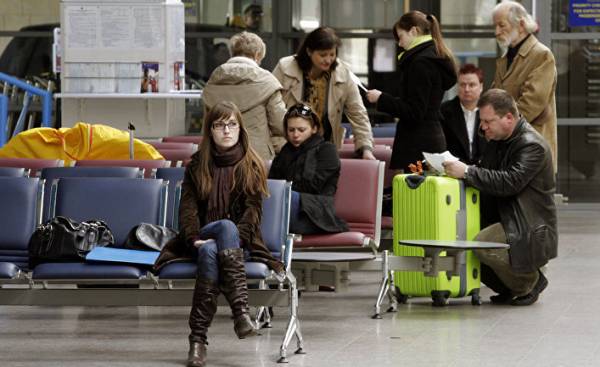
Transit say “goodbye!” or Latvia will become a transit and logistics centre of the Baltic States? Die out or become colored, checking that the Latvians are the closest relatives of the Hindus? Will export insolvency and combustible materials or ideas, and creative resources? The portal Delfi publishes the most interesting predictions from expert discussion “Latvia-2027 in the world, Northern Europe and the national economy” at the festival of communication Lampa in Cesis.
The first forecast of the next decade, undertook to give the host of the event IT-expert, humanist and blogger Dmitry Golubev, who has compared Latvia with Wonderland by Lewis Carroll, where you have to run twice as fast in order to get somewhere, and if you just run, everything will remain standing in place. As confirmation of the world speed up, he looked a decade ago: “In 2007 was born the first “iPhone” and today the capacity has increased by 50 times, but the number of employees and advertising revenue of printed media has fallen below the 50-ies of the last century.”
In 2006, the five largest (by market capitalization on the market) companies included Exxon Mobil (energy), General Electric (industry), Gazprom (energy), Microsoft (IT), Citigroup (Finance), in 2016, the entire top of the top Internet companies. The world is moving on the economy of collaborative consumption platforms Uber, Facebook, Alibaba, AiRbnb… Enterprises have become significantly more use of wind and sun, but carbon consumption in Europe is falling…
Thus, according to Golubeva, Latvia lags far behind. “The country still lives without a purpose — the plan which Richard Gailus called the “Plan of indecision and backwardness”. We still have the mentality of agricultural and resource Economics, in my head we where were in the middle of the 20th century. The problem of the occupation we are trying to solve by the methods of the last century, and that of Western Europe to achieve methods of Eastern Europe. We admire Estonia, but I don’t want to act like them. We still strongly the legacy of the Soviet Union — closed society in which people do not trust others. Russian propaganda works, there is a hatred of globalization… keep going in a changing world is impossible”.
Golubev offered his vision for the future of the world and Latvia.
— “Technology-2027: more non-cash payments (in China, even in the market you can pay by card), glasses with an integrated screen, self-propelled electric machines built in human sensors, transplantation of 3D-bodies…
Logistics-2027: will the construction of Rail baltica, but the trains will run, most likely, not people, and trucks will drive themselves, the couriers will deliver the goods…
Business-2027: self-checkout, artificial intelligence for customer service in the Bank (in Scandinavia already have Nina), automated accounting, 3D printing…
Latvia-2027 (dreams): the growth of regional cities (won’t be that big of a difference, people work in Riga or not); in 2020 we will survive the crisis caused by rising unemployment, which will allow us to understand the need for reforms; in the mid 20-ies, I hope to win the war of misinformation, populism and authoritarianism — start revaluation of values”.
Gathered at the event, experts were not unanimous in the predictions for the future. If some predicted Latvia’s depopulation, others have argued that “a Holy place is never empty”. If the priest Jan Aroma-Greenberg encouraged in the pursuit of well-being not to forget those whom life has thrown overboard, and offered to consider the possibility of introducing an unconditional basic income, a partner at the investment company Prudentia girt ruginis was strongly against, saying that this idea smells of communism, “As a man, and had lived in the developed socialism, and served in the Soviet army, I would do anything to not move in that direction. It is better to err in the other direction, but going back there won’t.”
As strongly ģirts Rungainis and economic expert of DnB Bank Peteris Strautins dispelled the dream of the head of the society “Baltic Association — Transports un Loģistika” Inga’antan that Latvia could become the Central transport and logistics centre of the Baltic States. All agreed that Latvia would do well to decide where she is going to move, or you can turn into a large ethnographic Museum. Experts talked about their views of the Latvia-2027.
Ģirts Rungainis: the whole Latvia wants to live in Germany, even speaking
— We all in this country have a common goal — they want to live in Germany. In Germany. In the same houses, same roads, cars, stores and prices. Only speak Latvian. This common goal of all Latvians. Thus, if we take the so-called Russian-speaking, they can say anything, but in reality they drive German cars, on which is written “To Berlin!” So we are one. And 100 000 Russian-speakers who immigrated in the EU, only 600 went to live in Russia. So, without a doubt, they also want to live in Germany…
The only problem is that the creation of a model of our future — the construction of the Germany — implement the Soviet leaders: members of the Komsomol, the Communists and the KGB. The Soviet management. And we ourselves for the most part — the Soviet people.
What awaits us in 2027-and the year? Let’s count! Every year we have kills about 30 thousand people a year, and born — about 20 000. This means that in 10 years we will die 300 thousand persons — basically it will be Soviet citizens. Without a doubt, and among them too there are nice and smart people, but, more importantly, to change the ideas we need to change people. 40 years, Moses led the Jews through the Sinai desert to die slaves. Slaves must die, including those who teach children.
In turn, 200 thousand births in 18 years will receive voting rights. In 10 years we will have about half a million new voters who grew up in comparative freedom — they are already far from the horrors that were in our history. Plus every year we come to about three to five thousand per year today’s foreigners. And this number is growing. What attracts foreigners here? For example, Latvian women Latvian — based civilizations: their charms are hard to resist. Men are where women. This is one method. There are others.
In addition, the standard of living increases. Today in Riga the level of life — 78% of the European average. And many want to live here — it’s full of Germans, Swedes, etc. For 10 years — about 50 thousand. When it was forced to leave the Baltic Germans, was destroyed, our Jews — there were 50-60 thousand. And that’s what we need: to attract additional normal people. It is clear that some of them will be from the former Soviet Union, but they are the most normal of the population that is there… Part of them are corrupt and thieves, but they at least have money. And most of their children also want to live in Germany… This is good news!
I am very skeptical to the development of transport and logistics in Latvia. I think the transit of goods and of different substances, and we say “good-bye!” It might not happen for 10 years, but will decrease clearly, that’s ridiculous. We hurt the main asset of our country — the city-state and a flaming motor Riga to carry through it the coal blocks and mineral fertilizers is idiocy! One explosion and everything… We become one of the most explosive objects in the EU. Still this city is in the center. It is clear that it suits our wonderful Soviet management, but this must stop.
Yes, there has always been a transit, but why Riga became the only suitable city in the Baltics? Because neither the Estonians nor the Lithuanians did not have such rivers, and we have a highway Daugava. How else in those days was to transport goods? Because there built many Railways, but only because it was the Baltic Germans, who were able to build and maintain… In the 21st century via Riga have to go the transit of people, ideas and information about it need to think in this future! Transit is part of the commodity economy, which, in ten years, we at most get rid.
I also rejoice and hope that will end soon available EU funds — they have become one of the largest resources of our economy, which redistributes capable people, instead of having to create resources. There are three kinds of Economics — distributive, redistributive and creative. The Soviet economy — to a large extent, the economy of redistribution. All kinds of socialism — the economy of distribution. In our country, only 600 thousand people working in the private sector, and create all the money out of their money is paid in the public sector and so on. We need to grow the economy it creates.
We live in very interesting time (in this sense, the optimist) is increased and starts to have children the first post-Soviet generation born in the second half of 80-ies, when the birth rate was at its peak (4-4,5 thousand a year) is the largest generation. They have learned in the post-Soviet period, they were plagued by less than in the Soviet period — they see the absurdity of the world in which we live. And today, when they send their children to school and drive to the doctors, they see the idiocy in all areas — in education, medicine, and all non-viable polyresine politicians who made so people did not think that the government does nothing. But it is only in appearance, everything is functioning, but really — nothing.
I believe that this generation in the next decade will replace a significant portion of the Soviet management. People who come without Soviet of the tail will also be bugs (some of them also brought up the Communists and the KGB — we won’t live in illusions), and yet they will be more energetic and coherent, to make a real change. For ten years we can expect another economic crisis, including the bubble in real estate — some of these people after some time will buy houses and then not be able to pay off the loans, but nothing is done about it. With each shake, we become smarter.
I wish Latvia plenty of entrepreneurial spirit, critical thinking and a complete overhaul of the education system — the Latvians for centuries went ahead, because I studied, and today this area is in a terrible state. I hope soon it will change — we need competent experts.
Girts Greiskalns: ambassadors complain that Latvia becomes the power ‘threw’
For the last 17 years, Latvia has lost 18.8% of residents. That is, in the past year we have not had a whole Cesis (18 thousand 800 people) — one bus a day. And if not people, then Latvia will only place on the map, through which passes in Germany and Poland train Rail Baltica, not stopping in the green forests. Ironically, every year we have a growing statistics in terms of traffic per inhabitant… because residents become less.
I think one of the most important unsolved problems — the demographics. In African countries very low level of social services, poor education and medicine, but there are a lot of children… If anything I would like to wish Latvia in ten years, so it’s 3-3. 5 million inhabitants.
The second important problem is the rules of the game: the legality and ethics of entrepreneurship. Local businessmen and foreign investors could pursue my dreams to help local residents, but the business environment is such that the ambassadors complain: Latvia becomes a power throw. Coming here, you can three months to inflate 50 thousand or your money will repartition through the scheme of insolvency… We don’t want to be a country that exports insolvent?
Common rules may be different: one is established in laws and regulations or the effect — to be left with nothing. Our Communist leaders often provide a second option: a certain industry they provide guaranteed income, agriculture, beekeepers… and now transit wants compensation, because of geopolitical risks can not obtain a guaranteed income.
We must do everything that the law works. It is better to develop in this direction, than to put new restrictions. Limitations there are those who know how to get around them. For example, 10 years ago, large investments came to us from Scandinavia, England and America, and now our main investors are Cyprus, the Netherlands and Russia with Belarus. Not saying that’s a bad thing, they make investments with their ethics.
Peteris Strautins: will check, is it true that Latvians are almost Hindus
— Strengthen internal migration in Latvia. Not only Riga will live at the expense of other cities. Part of its immediate environs will continue to grow — definitely.
We have a wonderful situation where in the capital there is a large part of the population… In this sense Riga you can compare with Vienna. Although in Riga today people live less than in the upper historical point. Vienna has recently reached the highest point, which was at the end of the collapse of the Empire, which was much larger territory than modern Austria. After the fall of the dynasty the city was plunged into a great crisis, Economics and identity… And now they have surpassed the former highest point of development. To a greater extent, due to the financial and business services and exports.
Not only Riga and its suburbs will grow in other regions too, will be a concentration around the big cities… for example, in Vidzeme — Cesis, Valmiera and Smiltene… Maybe Kuldiga.
In the future Latvia is not facing depopulation, because it’s a better place to live than the average for the world. About 1.3 billion people on Earth live in countries where income per inhabitant average, and 6 billion — where below average. I think that the difference between the average and include the income level will grow rather than diminish… there are many places where almost every person can find a quiet and green area, where you can go away for the weekend and you where no one sees it.
Maybe not in the next 10 years, but in the near future, residents of Latvia will be more colorful… Comes the migration of exotic territories will provide financial processes and development of real estate. This will be a recurring theme. Don’t know if they are Christians. Here we will examine the assertion that Latvians are almost Hindus.
The share of transit will certainly decrease. Today, the share of transit in GDP — a third of what it was in 2000-m to year, was 12% and now 4%. Transit was not the only “big idea” development in Latvia. And generally, these “big ideas” detrimental to Latvia. The theory that Latvia will become the country banks did not bring good banks. The passion for agriculture brought a short-term effect, but is unlikely to return. Climb a tree – and metal working. Transit today brings a profit, but I discourage people to go there. Now to develop something else entirely.
It is not necessary to wait that the future will be a logical continuation of the past — at some point the process can go in a completely different direction.







